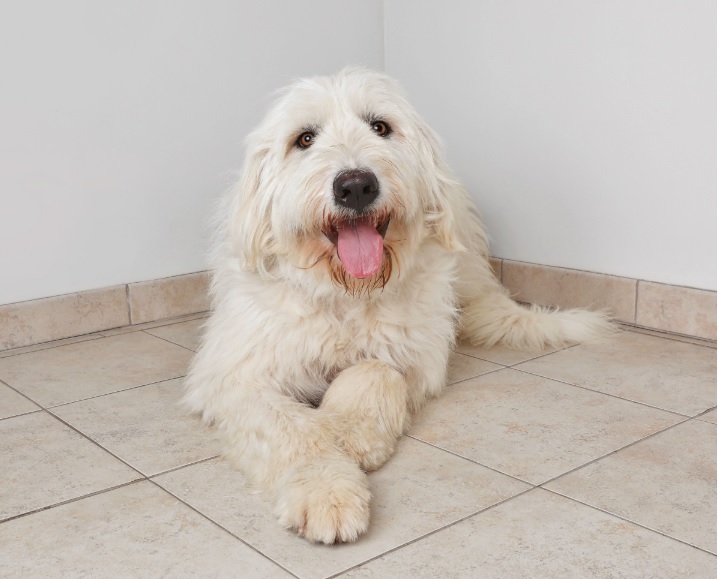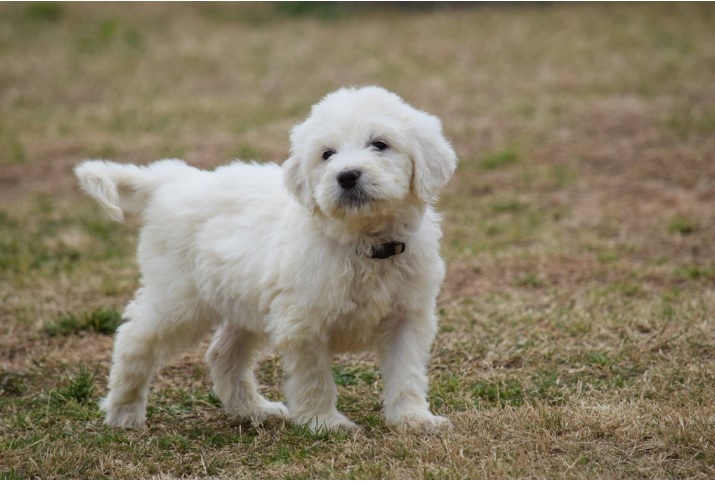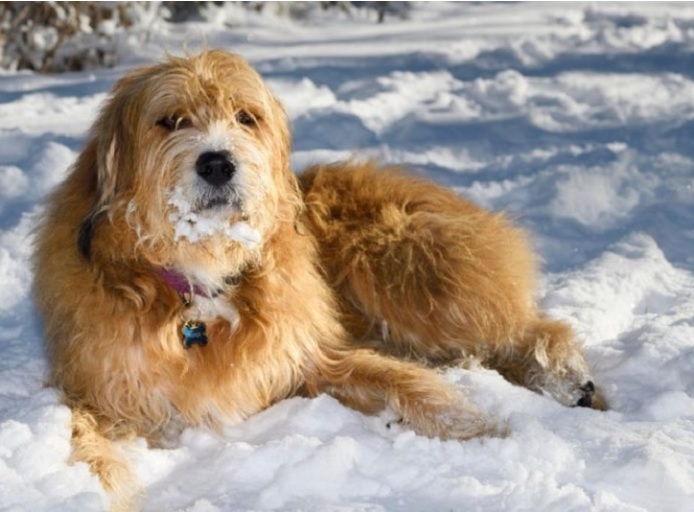
This article will explore all aspects of this relatively new canine companion’s temperament, health concerns, best living environment, and more.
We’ll also look in-depth at how to care for your Pyredoodle so they can live their happiest life possible!
Origins Of The Pyredoodle
The Pyredoodle, is a cross between the great Pyrenees and standard poodle, is an increasingly popular dog breed that has gained recognition recently.
Designer breeders started to mixed dog breed originated from careful bloodline research to create a unique combination of traits like the standard poodle and great pyrenees parent. Pyredoodles are known for their intelligence and friendly nature and are highly recommendable for owners that needs an excellent family dogs.

The physical characteristics of this breed vary depending on which parent’s genes are dominant – they can range from more poodle-like features such as curls or waves in its coat.
They typically come in red shades but can also be found in black or white colors. Regarding size, Pyredoodles usually stand between 20 and 26 inches high at the shoulder and can weigh anywhere from 35 to 70 pounds when fully grown. Overall, the Pyredoodle is an intelligent and loving companion that makes a great addition to any family looking for a loyal pet.
This endearing breed will provide endless love, joy, and companionship for many years with proper care and training.
What are Great Pyrenees are known?
- Their size: Great Pyrenees are large dogs, typically weighing between 85 and 115 pounds and standing between 22 and 32 inches tall at the shoulder.
- Their thick white coat: Great Pyrenees have a thick, white coat that is designed to protect them from the elements.
- Their gentle and loving nature: Great Pyrenees are known for being gentle and loving dogs. They are good with children and other pets, and they make excellent companions for people of all ages.
- Their intelligence and trainability: Great Pyrenees are intelligent large size dogs and relatively easy to train. They are eager to please their owners and learn new things.
- Their loyalty and protectiveness: Great Pyrenees are very loyal to their families and are protective of their homes. They make excellent watchdogs, but they are not typically aggressive.
Physical Characteristics
Great Pyrenees and a poodle combined physical characteristics to become Pyredoodle at an early age that makes them a highly sought-after large dog breeds. Like the great pyrenees their coat texture is silky and smooth, giving them a luxurious look when allowed to grow out. Additionally, they come in an array of color variations:
- Red
- Apricot
- Cream
These colors are often seen with white markings on the face or chest.
Pyredoodles is a hybrid breed known for their beautiful medium-length coats, deserve the best dog brush to ensure they stay looking their absolute finest. Regular brushing and trimming are essential for maintaining their coat’s shape and preventing pesky tangles from taking hold.
Pyredoodles with a double coat will need to be brushed daily to prevent matting and tangles. They may also need to be trimmed or shaved regularly to keep their coat manageable.
Popular Great Pyrenees mixes
Breeders wanted to mix the pyrenees for the most popular purebred:
- German Shepherd Dog: This mix, also known as the Germans, is a good choice for people who need a working dog. It is a very intelligent and trainable dog that can be used for tasks such as police work and military work.
- Anatolian Shepherd Dog: This mix, also known as the Anatolian Pyrenees, is a good choice for people who need a watchdog or guard dog. It is a large and powerful dog that is very loyal to its family.
- Labrador Retriever: This mix, also known as the Pyrador, is a popular choice for families because it is good with children and other pets. It is also a very intelligent and trainable dog.
POPULAR POODLE MIXES
Designer Breed has a good idea to find poodle mixes:
- Labradoodle: A cross between a Labrador Retriever and a Poodle, the Labradoodle is a popular choice for families because of their intelligence, trainability, and gentle nature. They are also relatively low-shedding, making them a good choice for people with allergies.
- Goldendoodle: Another popular choice for families, the Goldendoodle is a cross between a Golden Retriever and a Poodle. They are known for their friendly and affectionate personalities, as well as their intelligence and trainability. Goldendoodles are also relatively non-shedding.
- Cockapoo: A cross between a Cocker Spaniel and a Poodle, the Cockapoo is a small to medium-sized dog that is known for their intelligence, playful personalities, and low-shedding coats. Cockapoos are also relatively easy to train and make great companions for people of all ages.
Temperament And Personality
The Pyredoodle is a breed with physical and behavioral traits in its genes.
Like any other type of dog, how it looks on the outside can vastly differ from how it behaves inside. Each individual has two distinct personalities – one for show and one for substance.
Physically, the Pyredoodle has a unique combination of features that make them stand out among their canine peers. They have long fur coats, distinctive swirls or patterns, an angular muzzle, and wide-set eyes. While they don’t shed much, they require regular brushing to keep their coats shiny and healthy.
When it comes to temperament and personality, Pyredoodles is a delightful combination of friendly and loyal companions. They thoroughly enjoy the company of people and thrive in outdoor activities and playtime.
They are also brilliant animals that thrive when given mental stimulation through training activities such as agility courses or obedience classes. However, despite their sweet nature, these dogs need proper socialization during puppyhood to ensure good genetic behavior around strangers or other pets.
Life Expectancy of Pyredoodle
The average lifespan of a Pyredoodle is 10 to 12 years. However, the lifespan of a Pyredoodle can vary depending on a number of factors, such as genetics, diet, exercise, and environmental exposure.
Life Expectancy of Pyredoodle
The average lifespan of a Pyredoodle is 10 to 12 years. However, the lifespan of a Pyredoodle can vary depending on a number of factors, such as genetics, diet, exercise, and environmental exposure
Genetics
The health of the parent dogs can have a big impact on the lifespan of the puppies. Dogs that are bred from healthy parents are more likely to have a longer lifespan. Some of the health conditions that can be inherited from parents include hip dysplasia, elbow dysplasia, and bloat.
Diet and exercise
A healthy diet and regular exercise can help to keep a dog’s body healthy and prevent the development of some health problems. Dogs that are overweight or obese are more likely to develop health problems, such as heart disease, diabetes, and arthritis. Exercise can help to keep a dog’s weight under control and can also help to reduce the risk of developing certain types of cancer.
Environmental factors
Exposure to toxins, pollutants, and other environmental hazards can shorten a dog’s lifespan. For example, dogs that live in areas with high levels of air pollution are more likely to develop respiratory problems.
Health conditions
Some dogs are more prone to certain health conditions than others. These conditions can shorten a dog’s lifespan if they are not properly managed. For example, dogs with hip dysplasia may develop arthritis in their hips as they get older. This can make it difficult for them to walk and can lead to other health problems.

Accessing quality medical care when necessary can help prevent serious illnesses from developing, which may otherwise reduce lifespan if left untreated.
Overall, life expectancy is determined by a combination of both genetic and environmental influences. By understanding these different aspects of mortality risk factors, we can better support our communities in achieving longer lifespans for all members regardless of gender or socioeconomic status.
Taking preventive measures such as engaging in healthy activities and accessing medical care when needed is vital to increasing longevity and improving the overall quality of life across generations.
Nutrition And Diet
When it comes to nutrition and diet, Pyredoodles have several options. Many owners choose vegan diets for their pets, free of animal ingredients such as meat and dairy products. This type of diet is not only more ethical but can also help reduce environmental impacts associated with the production of animal-based foods.
Grain-free diets may be another good choice; these food plans limit or eliminate grains from a pet’s daily meals, benefiting animals that struggle to process carbohydrates due to health issues.
When it comes to the dietary needs of your Pyredoodle, it’s essential to consult with a veterinarian, especially when considering a transition to a new food such as Dr. Marty Dog Food. A trusted vet can provide valuable guidance tailored to your pup’s specific nutritional requirements, dietary restrictions, allergies, and overall health and well-being. Their expertise ensures that your Pyredoodle receives the best possible food plan to support their optimal health and happiness.

Even if you opt for a vegan or grain-free diet for your Pyredoodle, remember that supplements may still need to be added to their eating routine to ensure adequate amounts of essential nutrients like vitamins, minerals, and fatty acids are present in their meals.
To keep your Pyredoodles healthy and happy long term, proper nutrition is vital – make sure you feed them high-quality food tailored to meet all their dietary requirements. Be mindful that while an exclusively vegan or grain-free meal plan might suit some pups better than others, variety is significant, too, when it comes to providing balanced meals packed full of necessary macronutrients and micronutrients!
Grooming And Maintenance
Proper coat care is paramount for Pyredoodles, especially considering their stunning long coats. To ensure they always look their finest, regular brushing is a must—aim for several sessions each week. But that’s not all—routine shampooing and conditioning are equally vital to maintain their fur’s health, giving it a lustrous and vibrant appearance.
While attending to their coat, be sure to check for any mats or tangles, as addressing them promptly prevents any discomfort for your beloved Pyredoodles. When it comes to selecting the best dog shampoo for allergies, consult with your veterinarian for expert recommendations tailored to your Pyredoodle’s specific needs.
When it comes to vet visits, they should be scheduled at least twice a year to ensure your pet’s overall health:
- Vaccinations: To protect against common illnesses like rabies and distemper.
- Parvovirus vaccine
- Rabies vaccine
- Distemper/Parainfluenza combo vaccine
- Examining teeth & gums: Checking for signs of gum disease and tartar build-up.
- Heartworm test: A yearly heartworm test helps diagnose the early stages of this potentially fatal condition in dogs.
It’s also wise to consider potential medical issues associated with certain breeds, such as hip dysplasia or eye diseases – regular screenings from a vet will help detect any symptoms before they become serious problems. Taking proactive steps now could save you money (and worry) later on down the road.
Training And Socialization
Here are some tips for training and socializing your Pyredoodle:
- Start with basic obedience commands. These commands, such as sit, stay, and come, will help you to establish control over your dog and will make it easier to train them for more advanced commands later on.
- Use positive reinforcement. This means rewarding your dog with treats, praise, or play when they do something you want them to do. This will help them to associate good behavior with positive outcomes.
- Be consistent. This means using the same commands and techniques every time you train your dog. This will help them to learn what you expect of them and will make it easier for them to follow your instructions.
- Be patient. Training a dog takes time and patience. Don’t get discouraged if your dog doesn’t seem to be learning as quickly as you would like. Just keep practicing and they will eventually get the hang of it.
Socialization can be done in a variety of ways. Here are a few ideas:
- Take your dog for walks in different neighborhoods and parks.
- Introduce your dog to new people and animals.
- Visit pet stores and other places where your dog will be exposed to new sights and sounds.
- Take your dog to puppy classes or obedience training.
Socialization is an important part of raising a well-adjusted dog. By following these tips, you can help your Pyredoodle to become a well-behaved and friendly member of your family.
Potential Health Concerns
Pyredoodles are generally healthy dogs, but they can be prone to some health problems. These include:
- Hip dysplasia: This is a condition in which the hip joints do not fit together properly. It can cause pain, lameness, and arthritis.
- Elbow: This is a similar condition that affects the elbow joints.
- Bloat: This is a life-threatening condition that occurs when the stomach twists and fills with gas.
It is important to take your Pyredoodle to the vet for regular checkups so that any health problems can be detected early. You should also be aware of the potential health concerns of the breed so that you can take steps to prevent or manage them.
Here are some tips for keeping your Pyredoodle healthy:
- Provide a healthy diet: A healthy diet will help to keep your dog’s body healthy and prevent the development of some health problems.
- Ensuring regular exercise: Regular exercise will help to keep your dog’s weight under control and can also help to reduce the risk of developing certain types of cancer.
- Taking your dog to the vet for regular checkups: This will help to detect any health problems early on, when they are more easily treated.
- Keeping your dog up-to-date on vaccinations: This will help to protect your dog from serious diseases.
- Using flea and tick prevention: Fleas and ticks can carry diseases that can be harmful to dogs.
- Providing regular dental care: This will help to prevent gum disease and other dental problems.
By following these tips, you can help your Pyredoodle live a long and healthy life.
Early Socialization Tips
Socializing your Pyredoodle puppy is a vital part of their development. It helps them form positive relationships with other animals, people, and the environment around them. Here are some early socialization tips to help you get started:
- Expose Your Puppy To Different Experiences – Start exposing your pup to different sights, sounds, smells, and textures in order to acclimate them to new environments.
- Playtime Rules – Teach your puppy how to interact appropriately during playtime by setting boundaries and rules from an early age. This includes teaching cues such as “sit” or “stop” when they become too excited or nipping becomes excessive.
By starting off on the right foot with these early socialization techniques, you can create a strong foundation for lifelong learning and growth within your pup!
Best Living Environment
If you are considering getting a Pyredoodles, it is important to make sure that you have the time, space, and energy to meet their needs. They are great dogs for active families who are looking for a loyal and loving companion.
Here are some specific living environments that would be good for a Pyredoodle:
- Houses with yards: A fenced-in yard is ideal for a Pyredoodle, as it will give them plenty of space to run and play.
- Active households: Pyredoodles are very active dogs, so they need to be part of an active household. If you are a family that enjoys going on hikes, runs, or playing fetch, a Pyredoodle would be a great fit for you.
- People with experience with Big dogs: Pyredoodles are large dogs, so they can be difficult to handle for people who are not used to. If you have experience with large breed, you will be better equipped to handle this gentle giant Pyredoodle.
If you are not sure if a Pyredoodle is the right breed of dog for you, it is a good idea to talk to a breeder or rescue organization or adopt to reputable rescue groups and has shelter like bonevoyagedogrescue.
Introducing A Pyredoodle To Your Home
Introducing a Pyredoodle to your home can be a fun and exciting experience. However, it is important to do your research and prepare your home before you bring your new furry friend home.
Here are some tips for introducing a Pyredoodle to your home:
- Create a safe and comfortable space for your dog. This could be a crate, a designated area in your home, or a spare bedroom. Make sure the space is well-ventilated and has plenty of space for your dog to move around.
- Introduce your dog to your family and other pets slowly and carefully. Let your dog sniff around and get used to everyone’s scent before you try to pet or play with them.
- Give your dog plenty of time to explore your home. Let them sniff around and find their favorite spots to sleep, eat, and play.
- Start training your dog as soon as possible. This will help them to learn the rules of your home and how to behave properly.
- Be patient and consistent with your training. Pyredoodles are intelligent dogs, but they can also be stubborn. It is important to be patient and consistent with your training so that your dog learns what you expect of them.
- Take your dog for regular walks and playtime. Pyredoodles are active dogs, so they need plenty of exercise. Taking them for regular walks and playtime will help to keep them healthy and happy.
Common Questions About Pyredoodles
Now that you’ve decided to welcome a Pyredoodle into your home, you must know some common questions about this breed. Before making any other decisions, it is essential to understand their exercise needs and playtime requirements.
Pyredoodles are active dogs with moderate energy levels. They require daily walks, runs, and interactive activities like fetch or tug-o-war to stay healthy and happy. While they don’t need hours of intense exercise daily, regular outdoor time is necessary to keep fit and mentally stimulated. Additionally, due to their high intelligence level, providing puzzles or training sessions can help channel their energy positively.
It’s also important to realize that Pyredoodles have different personalities – some may need more physical activity than others – so observe how much exercise works best for your pup individually.
Similarly, when deciding on the length of playtime each day, take note of your dog’s behavior; if they seem overly tired at the end of the session, they may need less time outside playing.
Getting familiar with your pet’s specific preferences will ensure you and your pup enjoy a fulfilling relationship together!
Finding a Trusted Shelter: Bone Voyage Dog Rescue
Choosing the right shelter is an important decision when looking to adopt a dog. It requires research, as well as comparison shopping in terms of reputation, adoption process, health standards, and the overall quality of care provided to their rescued dogs.
The first step in finding a trusted shelter should be researching online for recommendations from trusted sources or friends who have had positive experiences with Bone Voyage Dog Rescue. When possible, visit the shelter to get a better understanding of how they operate, including seeing firsthand the living conditions and care provided to their rescued dogs.
Ask questions about their adoption practices and don’t hesitate to inquire about the health evaluation and veterinary care given to the dogs before they are made available for adoption.
Tips For A Happy And Healthy Pyredoodle
Now that you have found a reputable Pyredoodle breeder, it is time to focus on how to keep your pup happy and healthy. Pyredoodles are incredibly intelligent and loving dogs that require an immense amount of care, attention, and activity in order to stay content.
Pyredoodle owners, here are some tips:
- Provide plenty of mental stimulation – Pyredoodles need lots of exercise and playtime but they also need mental stimulation. This can include activities such as hide-and-seek with treats, training lessons or indestructible toys.
- Make sure they get enough exercise – These pups were bred from two active breeds so make sure their exercise requirements are met by taking them out for long walks, playing fetch in the park or even enrolling them into agility classes!Pyredoodles may look tough when they grow to use this as watchdog and to take care of some intruder in your house.
Frequently Asked Questions
How Much Does A Pyredoodle Typically Cost?
when it comes to feeding requirements the breed is fairly low-maintenance – making it perfect for families with busy lifestyles. Though prices vary depending on breeder, age and quality of the pup you are buying; typically you can purchase a f1 Pyredoodle for around $1,000-$2,500 USD.
What Is The Typical Size Of A Pyredoodle?
A Pyredoodle is a hybrid dog, bred from the standard poodle and red setter. As far as size goes, this standard poodle mix breed can range from small to large in size—between 12-28 inches tall and 10-65 pounds.
Exercise requirements for a Pyredoodle depend on its size; smaller dogs may need less exercise than giant dog, while all sizes usually require at least two walks per day.
The Pyredoodle pictures as canine chameleon; its size, personality, and even mixed breed qualities can vary depending on the breeding considerations.
How Much Exercise Does A Pyredoodle Need?
When it comes to exercise intensity, another Pyredoodle should have a combination of short bursts of high energy activities like running or playing tag with their owner, as well as moderate playtime sessions that last around 30 minutes each day.
Is pyredoodle has a black nose?
Yes,The color of a Pyredoodle’s nose depends on the genes they inherit from their parents. If one or both parents have a black noses, the puppy is more likely to have a black nose as well. However, it is also possible for a pyredoodle to have a pink nose, brown nose, or even a spotted nose.
Conclusion
The Pyredoodle is an amazing pup that brings a unique energy to your home. They can be costly, but the price of love and companionship far outweighs any financial investment.
Their hypoallergenic coat makes them ideal for those with allergies, while their moderate size ensures they don’t take up too much space. Grooming should happen bi-weekly in order to keep their coats looking great, as well as regular exercise to ensure they stay healthy and happy!
“Unleash a Lifetime of Love: Click Here to Find Your Perfect Furry Companion at Bone Voyage Dog Rescue
